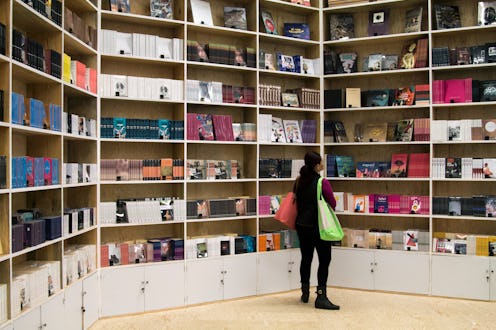Books
7 Feminist Poets You Need in Your Life
Whether you need a metaphorical shoulder to cry on or just need some extra woman-power in your life, these feminist poets will not disappoint. The next time a relative at family dinner or a classmate in the lecture hall makes a sexist comment, you can spend some quality time with your poetry books to recover (and pick an eloquent quote to retort with for next time).
Sometimes, we’re lucky enough to find those writers who can articulate our own thoughts and feelings better than we can. That magical moment you find a line in a novel or poem that forces you to slam the book down on your desk and look up to the heavens in awe is something we all need once in a while. And as helpful as friends’ advice can be, sometimes you need the wisdom of your favorite writer to get you through a hard time.
These badass poets are like the cool aunts or older sisters I wish I had: They aren’t afraid to talk about the hard stuff, and their insight will make you come away feeling a little wiser. But just as a disclaimer, I can’t promise reading these poets’ books won’t induce a Holden Caulfield-esque dilemma: "When you're all done reading it, you wish the author that wrote it was a terrific friend of yours and you could call him up on the phone whenever you felt like it.” Except you’ll probably wish these poetesses could have you over for midnight coffee or tea and life talks for hours. A girl can dream.
1. Sharon Olds
Olds’ third poetry collection, The Gold Cell, will make you blush, cry, and gasp all within a few pages. Even though she’s writing about her own experiences, at least a few of Old’s poems will resonate with you to an eerie extent. She writes about sex, motherhood, and tumultuous family life with brutal honesty and beauty. It’s the type of poetry you’ll read in the corner of the library and feel like you’re keeping a scandalous secret. Plus, she and I share a birthday, so I like to think we’re soul sisters.
2. Margaret Atwood
Even if you’ve read Atwood’s most iconic novel The Handmaid’s Tale, you might not know she also writes poetry. Atwood moves across genres with ease, and if you’re a fan of her dystopian fiction, you won’t be disappointed with her verse. In “She considers evading him” from her collection Power Politics, Atwood writes about a dissolving relationship and the urge to change one’s partner or oneself:
“I could grow bark andbecome a shrubor switch back in timeto the woman image leftin cave rubble, the drownedstomach bulbed with fertility.”
The topics in her writing are consistent; she focuses on female subjects and their unique struggles.
3. Marie Howe
The Good Thief, Howe’s first poetry collection, was chosen by Margaret Atwood for the National Poetry Series. One incredible woman writer supporting another incredible woman writer is almost too much for me to handle. Howe often deals with darker topics in her poetry — her book What the Living Do is an elegy to her late brother, and her poem “Practicing” explores young female sexuality, beginning with the line, “I want to write a love poem for the girls I kissed in seventh grade.” From loss to love to sexuality, Howe writes to complex feelings without fear.
4. Lucille Clifton
Clifton was a prolific poet, exploring African-American identity, family life, and womanhood in her work. Voices is her most recent collection. Without using punctuation, Clifton crafts space and structure beautifully, and her poems don’t need many words to be chill-inducing. From the section “being heard” in Voices, she writes:
this is what i knowsome womens daysare spooned outin the kitchen of their lives.
Citing stories from her own family, Clifton writes about black womanhood with grace and power.
5. Honorée Fannone Jeffers
Jeffers’ most recent collection, The Glory Gets, was published just this year. Lucille Clifton was an inspiration to Jeffers, and her presence is strong throughout the collection — the poem “Light” is dedicated to Clifton. Jeffers navigates womanhood and African-American history through blues poetry, and the music of her language is absolutely gorgeous. The first poem in the collection, “Singing Counter,” is Jeffers’ response to the lynching of Hayes and Mary Turner and their child in 1918. It begins with the haunting lines, “The rope, the tree, / the tired comparison to Jesus on the Cross. Avoid the tropes.”
6. Anne Sexton
Sexton’s poetry collection Transformations is her reimagining of the classic Grimm’s Fairy Tales. Her dry, sarcastic narrative voice is addictive to read. In “Cinderella,” she writes:
Cinderella and the princelived, they say, happily ever afterlike two dolls in a museum casenever bothered by diapers or dust…their darling smiles pasted on for eternity.
Sexton also wrote “In Celebration of My Uterus,” with the refrain: “Sweet weight,/ in celebration of the woman I am.” Sexton committed suicide in 1974, and her tragic death left behind a legacy of complex, beautiful writing.
7. Adrienne Rich
You might have heard Adrienne Rich’s name before in a women’s studies class or read an essay from Of Woman Born: Motherhood as an Institution and Experience. But Rich wrote poetry as well as prose, dissecting and exploring sexuality, womanhood, and motherhood in her writing. Her set of “Twenty-one Love Poems” from The Dream of a Common Language are the perfect non-cheesy love poems to satisfy both your romantic and realist sides. Rich’s work spans from 1951 to 2010, so there’s plenty of glorious feminist writing to enjoy.
